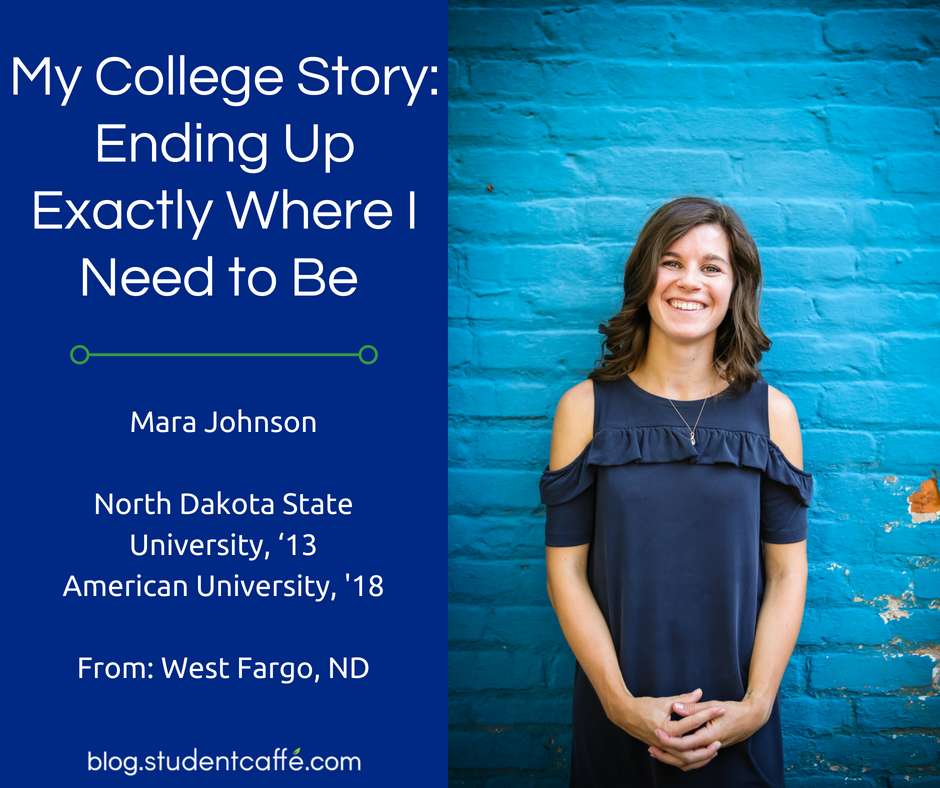
Mara Johnson
Mara Johnson was born in West Fargo, North Dakota, and didn’t travel far from home to attend college. In 2013, she earned a BS in business administration with a minor in fraud investigation from North Dakota State University, also located in Fargo. After gaining some experience with the Federal Reserve System, she returned to school part-time—while still working full time—to earn her master’s degree. In 2018, Mara graduated from American University with an MS is business analytics.
Q. Did you always know that you were going to go to college?
Yes. Growing up, it was always a matter of “where” I’d go to college, not “if” I’d go to college. I was lucky to have two parents and countless family members who valued education and taught me the importance of lifelong learning. It didn’t matter where I went, but continuing my education was the expected course of action.
Q. How did you choose your college? What did you like about that school over others?
I chose North Dakota State University (NDSU) because it was close to home and the business school was AACSB-accredited. While I wasn’t sure exactly what my career goal was, I knew that I wanted to do something related to math, banking, or finance. It made sense for me to major in business and figure out the details as I went. NDSU is also reasonably priced, as it is a medium-sized land grant university in the Midwest. I had a hard time stomaching the tuition expense at some of the other schools that were just four hours down the road.
Q. What's one piece of advice you wish you had before applying to college?
Two similar, but related, pieces of advice. I wish I would have listened to the people who told me college was my opportunity to move anywhere I wanted. I played it safe and stayed close to home. Secondly, I chose not to study abroad because I wanted to graduate early. My love for travel evolved during my last year of college and during the early years of my professional life. Shortly after graduation, I frequently looked back and felt like I missed out on something by staying in the Midwest for my entire college career. Now that I have a steady income and can travel in my free time, I don’t have any regrets. I’m exactly where I need to be now.
Q. What was your favorite experience in college?
The most fun I had in college was supporting our football team. I road tripped to Texas twice to watch our team bring home the national championship. Having fun is equally as important as working hard in the classroom. Colleges often have great perks for students, such as free or reduced-price tickets to sporting events and theater [shows]. Take advantage if you can!
Q. Did you have any pivotal experiences in college?
My program didn’t require internships to graduate, but a close friend of mine encouraged me to apply to internships and attend a career fair during the fall of my junior year. One thing led to another, and I ended up landing two internships. The first one wasn’t a good fit, but the second one, [which was] with the Federal Reserve Bank of Minneapolis, was great. Five years later, I’m still working in the Federal Reserve System. Without my friend encouraging me to apply for internships, I wouldn’t be living in DC working for the Federal Reserve Board of Governors today. That career fair set the stage for my professional life.
Q. Did you work during college? What positions? Do you feel like you were adequately prepared to enter "the real world?"
Yes, I was a bank teller and then a bank customer service representative. I worked anywhere from 15–25 hours a week. I felt prepared to enter the real world because this part-time job required me to dress and act professionally while dealing with real peoples’ banking needs. I was an 18 year old working with many people who were twice my age, requiring me to mature and learn about being professional very quickly. Also, I had to learn how to balance school, work, and my social life, which is a skill that is always going to be useful.
Q. What is your current career and how did your education prepare you for your position?
I work at the Federal Reserve Board of Governors as a financial analyst. My education gave me a baseline understanding of accounting, finance, economics, and more. Banking supervision is a unique career track and most of the skills needed are taught on the job. My baseline understanding of business terms and financial statement analysis was invaluable to my early success in banking supervision. I was able to learn quickly and become a productive team member.
Q. Do you have any advice for students who want to pursue a career similar to yours?
Seek internships. Bank regulators and many government agencies offer internship programs to undergrad and graduate students. Working for the government is not for everyone, [so] internships are a great opportunity to test the waters and learn about the culture before committing to a full-time position.
-
The Story of Student Caffé: The Source for Information on Higher Education
-
My College Story: From Baseball in College to Baseball on the Island
-
My College Story: From Small Town to Big Campus
-
My College Story: Expanding a Study Abroad Experience
-
My College Story: Feeling Accomplished after Earning Three Degrees
-
My College Story: Graduating After Years of Study, Transfers, and Time Off
-
My College Story: Student, Employee and Business Owner
-
My College Story: Starting a Design Business as a Young African American
-
My College Story: Living and Teaching English in Chile
-
My College Story: Winning the Chegg Contest to Volunteer in Ecuador

